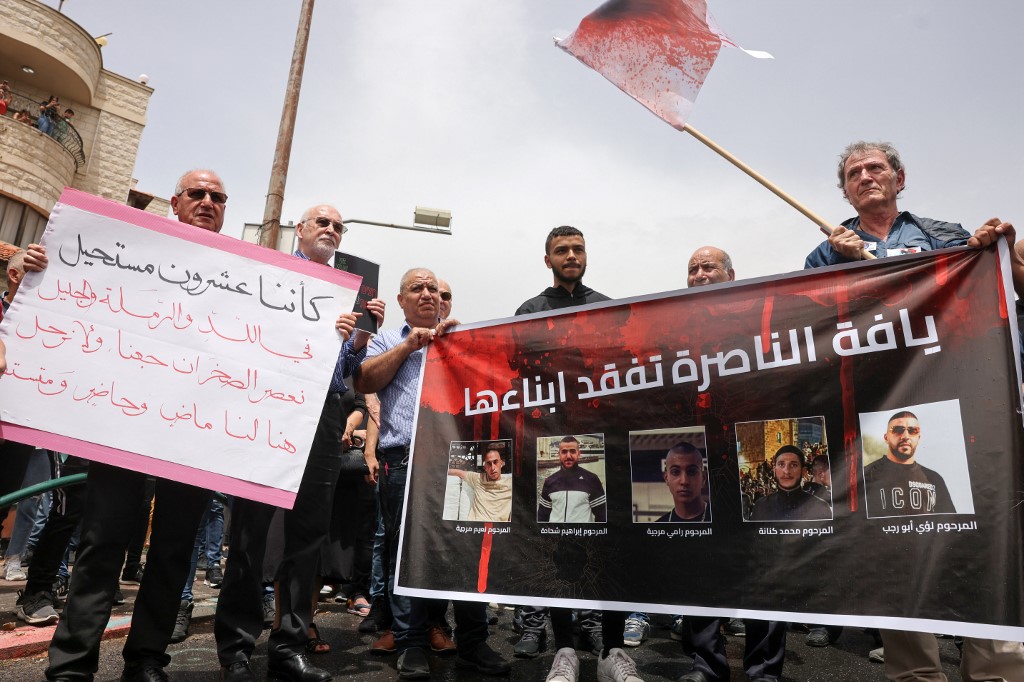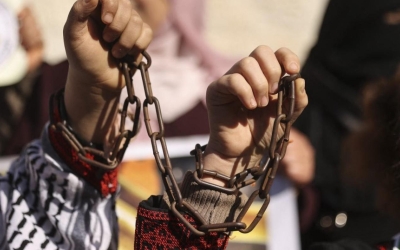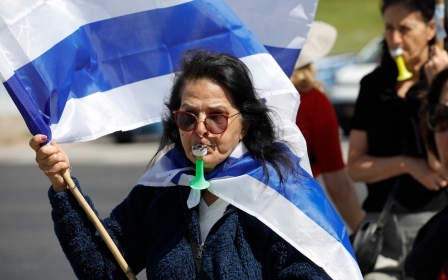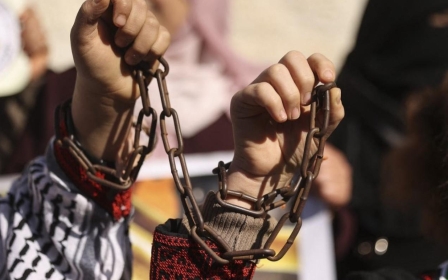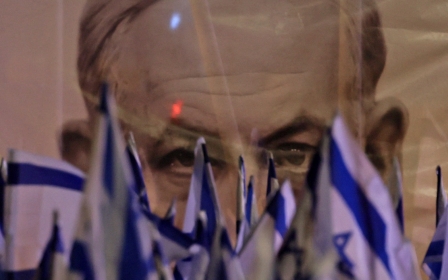Israel's Supreme Court rarely favours Palestinians. Under reforms, it never will
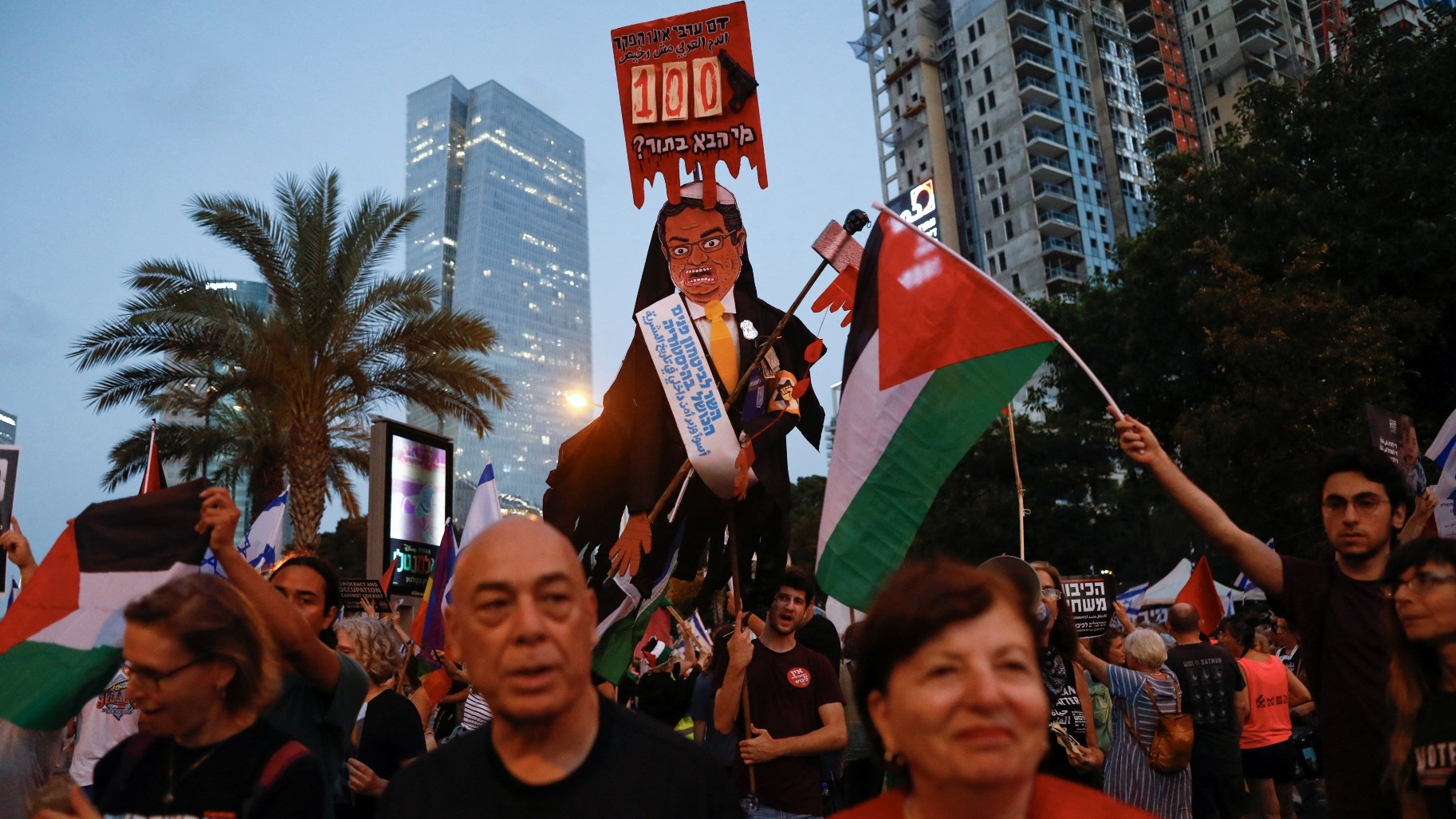
It is reasonable for any oppressed minority to be concerned by the ruling powers' attempts to dismantle judicial oversight - a process that allows courts to invalidate laws that encroach upon constitutional human rights.
Though the ongoing judicial crisis has sparked mass demonstrations among Jewish Israelis, for Palestinian citizens of Israel, the judicial system has never been seen as one that offers any protection against discriminatory laws and a system that privileges one group of people over another.
Generally, the existence of constitutional rights under a judicial system incapable of safeguarding them has very little to no value. What distinguishes constitutional rights is their special status, which forbids any encroachment on these rights except under stringent conditions or in extreme cases only.
Typically, it falls on the Supreme Court to make the final decision about the constitutionality of any given law.
It is in this context that the Israeli constitutional system has proven to be flawed at its very foundations. In the absence of a formal constitution, the Supreme Court has had no choice but to consider the rights outlined in its Basic Laws as constitutional rights. As such, it had to protect these rights and prevent any obvious violations by bestowing upon itself a power not directly granted by law: the authority to strike down any law that infringes on constitutional human rights.
The weakness of the Israeli constitutional system also lies in the absence of an independent constitutional authority or higher judicial body than the Supreme Court akin to the European Court of Human Rights. The latter's rulings have become an important reference, not only for the countries under its jurisdiction but also for any jurisdiction aspiring to implement a judicial system aimed at shielding individuals and groups from arbitrary laws, by declaring them wholly or partially null.
The question that arises in the Palestinian case is: just how impartial has the Israeli court been towards Palestinian petitioners who sought its intervention to appeal decisions or measures impeding their constitutional rights? Furthermore, will Palestinians actually lose a vital tool that guaranteed them the bare minimum of conditions to exercise their political freedoms and protect their constitutional rights?
To address these questions, one must first refer to the decisions in which the Israeli Supreme Court intervened and decided that legislation enacted by the Israeli parliament or certain provisions should be overturned.
No legal remedies
In 1995, the Israeli Supreme Court first recognised its authority to invalidate laws that were deemed unconstitutional and contradicted the Basic Laws. The landmark case United Mizrahi Bank versus Migdal initiated what was subsequently termed the "constitutional revolution" in Israel.
In the case of laws directly targeting Palestinians, the Supreme Court has intervened only four times
The legal precedent set in the United Mizrahi Bank case paved the way for the court to effectively overturn laws. The first time was in 1997 in a case involving investment managers who petitioned to overturn a law that required them to obtain a licence to work in investment management. The court recognised at the time that the provision blatantly infringed on the managers' right to freedom of work and repealed it.
Since then, the Supreme Court has annulled 21 legal provisions, bringing the total number of times the court intervened to 22 times only, as of the end of 2022.
In the case of laws directly targeting Palestinians, the Supreme Court has intervened only four times. Of those, it has stepped in twice in socio-economic cases that, while not specifically aimed at Palestinians, have significantly impacted them, particularly those holding Israeli citizenship, as they were the demographic most affected in those cases.
In order to fully understand the implications of these repealed laws on the lives of Palestinians and assess whether they have achieved a tangible impact, we must briefly consider each decision.
In 2006, the Supreme Court overturned a provision in the Civil Wrongs Law that deprived Palestinians in the occupied territories of their right to seek compensation for damages incurred from assaults by security forces. However, this decision resulted in no discernible change on the ground, nor did it reduce the aggression of the occupation forces. On the contrary, after the court's decision, the Knesset amended the law to further deprive the Palestinians of any compensation if their sustained damages resulted from an assault that was legally defined as a "military operation".
It is on this basis that several lawsuits filed by the families of killed or injured Palestinians were dismissed. They were rejected on the pretext that their killing or bodily harm was the result of a "military operation". The amended law shields Israeli forces from any financial liability, even if the victim had no role in any fighting.
A further legal development took place in July 2022 when the Supreme Court ratified a law that permanently exempts the state from any financial obligation to compensate for damages it inflicts on areas designated as "enemy territory" such as Gaza City, regardless of whether it was during a military confrontation.
Therefore, despite the initial legal "victory" of overturning in court a law that discriminated against Palestinians, the Supreme Court's ruling did not result in any kind of relief for those targeted by Israeli military aggression.
The main injuries sustained by Palestinians from occupation forces are not on "ordinary" or quiet days, but during brutal military operations that claim the lives of many, including non-combatants such as women and children.
These individuals were abandoned prior to the supposed victory at the Supreme Court, and their situation remains unchanged.
Separate and unequal
In a 2010 case, the Supreme Court ruled against a legal provision that allowed Israel's security service to deny Palestinian detainees the right to appear in court for a hearing on the extension of their detention.
The court recognised that the absence of the defendant, who is often denied access to his or her attorney, violates his or her right to a fair and just procedure. There is no doubt that one's presence and ability to advocate for themselves on serious matters is an important right.
The court's ruling afforded prisoners a brief respite by temporarily suspending their interrogations and giving them the opportunity to speak to the judge and perhaps share the ordeal they endured during the investigation - though the prospect of their release remains nonexistent.
I've yet to hear of any instance in which a detainee, appearing alone before the court while facing security-related allegations and denied legal counsel, has managed to secure their release. The most significant achievement for such a detainee, contingent on the court lending an ear to their case, is to obtain directives from the court mandating security authorities to accommodate the prisoners' specific, typically health-related requests.
In 2015, the Supreme Court upheld most of the provisions of Israel's "Anti-Boycott Law", which sanctions civil penalties imposed on those who call for a boycott of the state of Israel. The one provision the high court overturned allowed the plaintiff to seek damages without providing evidence of direct harm caused by the boycott call.
It would be impossible to consider the nullification of one provision a legal success when the key elements of an unjust law targeting Palestinians and their nonviolent activism remain unchanged.
In 2021, the Supreme Court ruled that an amendment denying government benefits to parents of minors who committed security offences was unconstitutional. The court found that the amendment violated the parents' right to equality and was "unusual" in that it held them responsible for their child's crimes. The court further underscored that the law unfairly distinguished between minors involved in "security" offences - which include stone-throwing - and those involved in conventional criminal activities.
Overturning one provision cannot be considered a success when key elements of an unjust law remain unchanged
While the court's ruling may seem to be a legal victory, there is no practical impact. It would more likely serve as material for legal analysis, teaching in law schools or as a topic of discussion at academic conferences and journals. This is because the court decided to repeal an amendment that was not in force at the time.
It was enacted as a temporary provision in 2015 for a period of three years and was not extended thereafter by the Knesset. The high court's decision sets an important legal precedent, however, in the event the parliament attempts to pass any similar legislation.
Discriminatory laws
In 2012, the Supreme Court overturned a law that denied income support to individuals owning cars. The court ruled to overturn two clauses in the Income Support Law, believing it violated the individual's right to a "basic dignified human existence".
Although the law affected impoverished citizens throughout Israel, its effects were primarily felt by the Palestinian minority due to their higher poverty rates and economic disadvantages. The Palestinian community also faced a greater risk of denial of income support benefits, which was often on the mere basis of possessing an older vehicle that remained registered under their name even though it may have significantly depreciated in value.
Also in 2012, the Israeli Supreme Court struck down a provision of the tax benefits law that excluded towns that had a Palestinian majority. The provision to provide tax exemptions was initially intended to assist settlers displaced from the Gaza Strip as part of the so-called "Israeli disengagement from Gaza" plan. Over time, the list was expanded to include other Jewish towns while excluding Arab ones.
The Supreme Court's verdict stated that the list of towns eligible for tax benefits was not based on any clear criteria and that it ultimately discriminated against the petitioning Arab towns.
What we can deduce from the above list of cases is that the number of laws that specifically discriminated against Palestinians and were overturned by the court does not exceed 30 percent of the 22 total laws that the Israeli Supreme Court intervened on. Among those cases in which Palestinian petitioners successfully persuaded the court to intervene - if just to address one provision in the entire law - the legal "victories" with any kind of tangible impact related to socio-economic conditions.
In some cases, they not only affected Palestinians but also other vulnerable groups within Israeli Jewish society (as in the case of income support due to the ownership or use of a car).
Meanwhile, the call to boycott Israel has earned legal sanctions and the cases that dealt with security-related matters (the court appearance of the detainee, compensation for Palestinians attacked by Israeli forces and allowances for the children of the prisoners) dealt with minor details or had a nominal impact.
Though they may serve as educational material for law schools and colleges in the country, these verdicts did not lead to any significant shift in the treatment of Palestinians - whether those killed or injured, juvenile prisoners or security detainees.
Failure to intervene
It must be noted that the accountability of the Supreme Court and its handling of discriminatory legislation cases concerning Palestinians cannot solely be evaluated by its verdicts. Equally important is to assess the cases in which it has declined to intervene and overturn laws deemed racist and unjust.
A prominent example is the racist Citizenship Law prohibiting the reunification of Palestinian couples, which the court failed to intervene in, not once, but twice.
This, of course, is just one example among several. There's the "Admissions Committees Law" that denies 1948 Palestinians admission to reside in most areas of the country. Another one is the Nation-State Law which enshrines Jewish superiority in the country through constitutional means. There's also the decision by the Supreme Court to uphold the force-feeding of Palestinian prisoners on hunger strike, as well as the Nakba Law banning the commemoration of the 1948 "catastrophe".
These are among several discriminatory laws that remain in the books without the court daring to challenge their validity.
One cannot deny the importance of going to court because taking legal action can still expose a number of issues, even if we fail. When a Supreme Court ruling spans hundreds of pages, it becomes more than just a legal text; it serves as a historical testament and an archive for future generations to understand Palestinian resistance to unjust and discriminatory laws.
Absent these court decisions, these laws might be normalised and accepted as ordinary codes that must be followed without question or challenge.
One of the changes requires unanimity in the judges' ruling to overturn a law - an impossibility
Despite the high court's deficiencies, the reforms undermining its ability to intervene in racist, discriminatory, arbitrary and vindictive laws targeting Palestinians - currently being proposed by Justice Minister Yariv Levin and his followers Simcha Rothman and others - is deeply disturbing, as it destroys any chance of a legal victory. One of the changes requires unanimity in the judges' ruling to overturn a law - an impossibility.
In the Supreme Court rulings on cases involving Palestinians, the judges were split and consensus among them was impossible to achieve. With the court's current composition and given the fundamental differences between them - including opposing views on intervening in legislation - a scenario in which a unanimous decision could be reached to overturn any law pertaining to the Palestinians is inconceivable.
Under these circumstances, we must presume that any petition brought to the court serves merely as a position statement, occupying the court with a matter that has a predetermined outcome. The significance of such a court decision would therefore not lie in its capacity to effect any change, but in its potential to contribute to a historical record for future generations to review.
Future challenges
As we enter this new stage, we anticipate facing challenges on two fronts: the first requires us to strengthen our faith in our political power and intensify mass protests, a departure from our long-standing preference for engaging in legal battles that are easier and do not cause any "trouble".
There is no doubt that going to the courts has a direct negative impact on political field work, as it diverts energy towards court sessions, institutional pleas, and interviews with petitioners and lawyers. Everyone then awaits the court's verdict and forgets the collective responsibility of maintaining mass mobilisation until and after its decision.
The second challenge involves seeking legal recourse at the international level. While we were previously able to petition Israeli courts with moderate hopes of success, today we stand with no chance of victory. This is the result of additional future laws that could strip us of our right to seek judicial remedies, specifically those which aim to prevent legal and human rights organisations from raising constitutional matters rather than the affected individual.
Proposals such as those by Minister of National Security Itamar Ben Gvir, which would exempt soldiers from criminal liability for the killing of any Palestinian, including those unarmed, and other laws designed to obstruct judicial oversight on the grounds of incompetency or the lack of a majority to repeal the law, are reasons to explore alternative legal avenues. The challenge is to find a judicial space where perpetrators could be accountable, supplementing the tools now unavailable to us within the confines of the Israeli judicial system.
To illustrate, one can refer to the coalition government documents that were signed by the parties at the start of its administration. Embedded within them are numerous provisions that not only signal an intention to implement a system of racial segregation and apartheid, but also propose criminal penalties targeted specifically at Palestinians, including the death penalty and the legalisation of the annexation of the occupied territories.
Given that this intent to commit crimes against Palestinians is openly declared and edging towards legalisation, it is our absolute obligation to resist it in the same way we would confront any crime where the perpetrator is determined to carry it out.
And since it is not practical to appeal to the perpetrator's own kin, which has eliminated any oversight, our only option is to turn to a higher level of authority. We must work to stop the criminal in their tracks, before further harm is caused, and to put the criminal on trial for daring to scheme to commit crimes - including war crimes of land theft, summary executions, impunity from accountability and crimes of apartheid within the "Green Line".
The views expressed in this article belong to the author and do not necessarily reflect the editorial policy of Middle East Eye.
Middle East Eye propose une couverture et une analyse indépendantes et incomparables du Moyen-Orient, de l’Afrique du Nord et d’autres régions du monde. Pour en savoir plus sur la reprise de ce contenu et les frais qui s’appliquent, veuillez remplir ce formulaire [en anglais]. Pour en savoir plus sur MEE, cliquez ici [en anglais].




